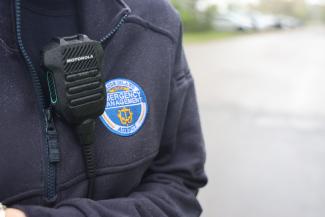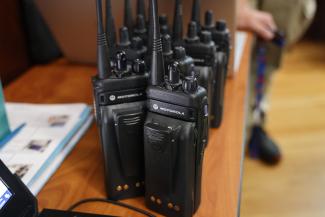Amateur Radio

Ops Support plays a pivotal role in Rhode Island’s emergency management system by integrating Amateur Radio to provide reliable, real-time communication when traditional systems fail. Amateur radio operators volunteer their time and expertise to support public safety efforts, ensuring that communication remains open and seamless during disasters or large-scale emergencies.
Amateur radio operators, often referred to as "hams," are specially trained individuals who use non-commercial radio equipment to provide communication support during emergencies. These volunteers serve as critical backups to public safety agencies by offering an alternative communication network when landline phones, cell towers, or internet connections fail.

Why is Amateur Radio Important?
Amateur radio serves as a lifeline in the absence of other communication infrastructure. In emergencies, public safety communications may be overwhelmed by the sheer volume of traffic, or systems could fail due to power loss or damage to critical infrastructure. Amateur radio offers a cost-effective, self-sufficient, and flexible communication solution that can be quickly deployed when needed.
Amateur Radio’s Role in Emergency Management
During large-scale emergencies, especially those involving power outages, infrastructure damage, or communication system failures, the ability to maintain open lines of communication is critical.
How Amateur Radio supports Rhode Island's emergency response efforts:
- Backup Communications: When conventional communication systems are overwhelmed or non-functional, amateur radio ensures that emergency management agencies, first responders, and shelters can still communicate. Ham radio can be used to relay important messages, update agencies on critical situations, and provide situational awareness.
- Incident Command Support: Amateur radio operators help set up and operate emergency communication networks for Incident Command Posts (ICPs) and Emergency Operations Centers (EOCs).
- Real-Time Data Transmission: Amateur radio allows for the fast and reliable transmission of real-time data and updates, such as weather alerts, disaster reports, and resource status.
- Mutual Aid Partnerships: In Rhode Island and across the country, amateur radio operators collaborate with local and regional agencies, sharing information and resources during multi-jurisdictional events.
Additional Resources
- ARES-RI: These groups offer training, support, and volunteer opportunities.
- Auxiliary Emergency Communications (AUXCOMM) is a credentialed position for communications of amateur radio within an emergency operations center.
- CISA (Cybersecurity and Infrastructure Security Agency) is responsible for securing critical infrastructure and cyber systems.
- SKYWARN offers a unique partnership between volunteer storm spotters, emergency management and the NOAA National Weather Service.
